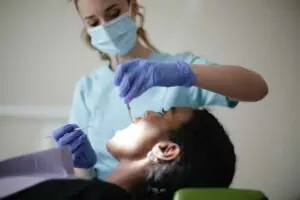
We all know how important it is to see your dentist in El Paso at least twice a year for routine dental visits. These check ups allow your dentist to monitor your oral health and keep an eye out for any changes such as cavities, gum disease, and other concerns. Seeing them every six months can help find any potential problems when they’re easier to treat. But what exactly happens during your routine dental visit while you’re laying back in the dental chair?
Before your dentist or dental hygienist gets to work looking in your mouth, they’ll likely ask you a few questions about your general health such as your medical history, medications, and allergies. They may also talk with you about any oral health concerns you have including pain, cosmetic dentistry concerns, or areas of discomfort. This is also a great time to mention any dental anxiety you may have so that your team can cater your care to your needs.
Your dentist in El Paso will usually take dental x-rays at least once a year to monitor oral health below the gums. Dental x-rays can also show early areas of decay that can’t be seen without the help of x-ray vision. Most dental offices now use digital dental x-rays which are not only considered very safe, but they also only expose patients to very low doses of radiation.
Following taking any necessary x-rays, your dental team may perform a cleaning. During this stage of the appointment, usually a dental hygienist will gently scrape away any plaque or tartar buildup from teeth and below the gums. This step is important because tartar can’t be removed by brushing your teeth at home, it requires special tools and techniques that your dental team is trained in. Next, your team will floss your teeth and polish them.
Between your dental hygienist and your dentist in El Paso, you may experience two different types of exams – one before or during your cleaning and one after. This varies depending on the office, but usually your hygienist will visually examine your teeth to look for concerns such as gum redness, visible decay, or sores. They may also measure the depth of your gum pockets to rule out any suspicion of gum disease. Then, your dentist will come visit and exam your bite, jaw, and individual teeth for any signs of decay.
Scheduling and keeping this bi-annual dental appointment are a crucial part of maintaining good oral health. Remember, it’s also important to take care of your teeth at home to reduce tartar buildup and the likelihood of cavities. Always brush your teeth twice a day and floss once a day.
He was excellent and pulled my wisdom tooth in less than 2 min. w/o chipping it. The service was good too.
Great dentist experience! While they do take my insurance, unfortunately, they are not part of my network, however, I liked them so much I will continue to see them.
We were very impressed with the helpful and friendly staff at this dental office.
I was very impressed and thankful with the service provided.
I’m 60 years old and I hated to go to the dentist, and put off going for a long time. But let me tell you Dr. Rizk is the best dentist I’ve ever had. I would of gone years ago. A no pain Dr. – thank you!
I frequently talk to my patients about the different types of dental crowns available to restore their teeth. Understanding the different crown materials available helps you make an informed decision about your dental care. Let me share my professional insights about your various crown options and help you determine which... Read More...
As a dentist practicing in El Paso, I often discuss dental crown cost without insurance with my patients. I understand that cost considerations play a significant role in dental treatment decisions, and I believe in providing transparent information about pricing and payment options. The dental crown cost without insurance typically... Read More...